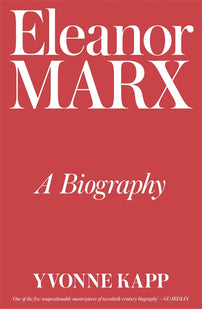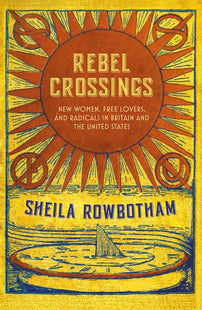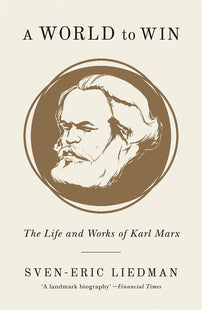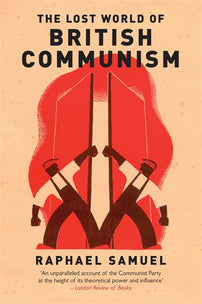Writing Eleanor Marx
In this excerpt from her memoirs, activist and writer Yvonne Kapp reflects on the decade-long research and writing of her definitive biography of Eleanor Marx.
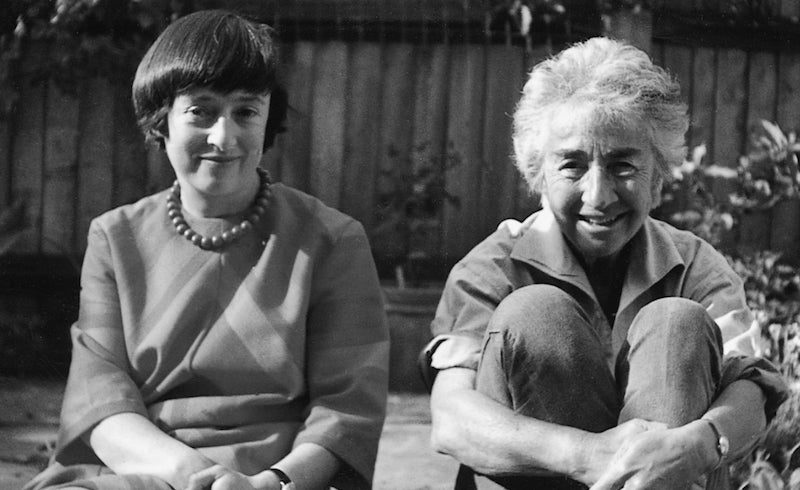
The life of Communist Party activist, writer, and translator Yvonne Kapp spanned almost the entire twentieth century. She is best remembered today for her definitive biography Eleanor Marx — called “one of the few unquestionable masterpieces of twentieth-century biography” by Eric Hobsbawm — a new edition of which is out next week from Verso as part of the Marx 200 series. First published in two parts in 1972 and 1976, it was reissued by Verso in a single volume in 2003, alongside Kapp's memoir, Time Will Tell.
In Time Will Tell, Kapp narrates the course of her life, from her disobedient childhood in a South London German-Jewish family, through her experience in the 1920s as a journalist and habitué of European bohemian circles — a context in which she was able to carve out a degree of professional and sexual freedom — and the political work to which she devoted herself after joining the Communist Party of Great Britain in 1935, which placed her at the center of movements against fascism and on behalf of refugees, and brought her into contact with figures like Paul Robeson and John Heartfield. She remained a CPGB member until her death in 1999.
In the excerpt below, the final section of Kapp's memoir, she describes the research and writing of Eleanor Marx, begun when Kapp was 64 years-old; a project that would consume a decade of her life.
I have said that the idea of writing the life of Eleanor Marx arose from my translating the correspondence between Frederick Engels and Laura and Paul Lafargue. Eleanor flits in and out of the pages of these three volumes in a most tantalizing way. Every reference to her evoked an interesting personality who aroused my curiosity. I wished I knew more about her, but when I enquired I found there existed no biography of her.
At a Christmas party in the early 1960s, I told Maurice Cornforth, then the managing director of a small publishing firm, that I should really like to write such a book. "And we’d really like to publish it," he said. There it rested for some years and then, when I had been plunged into research on the subject for about twelve months, there appeared, in 1967, the first biography of Eleanor Marx, written by a Japanese scholar. I was not deterred by this as, even at that stage, it was quite clear that I had an entirely different standpoint from this author.
A joke my daughter and I have always enjoyed is the admission that we are not among fortune's favourites. Never was this better illustrated than in the writing of Eleanor Marx. Thus in July 1969 I went to East Berlin for the second time to do research at the Marx–Lenin Institute and had not been there more than twenty-four hours, had done just one day’s work, when I had an accident in the street and smashed my kneecap. (I fell, as I had occasion to tell the doctors, on the same day as the Bastille.) I was in hospital for the next five months, going home only at Christmas. Thus it was that I never got to Moscow at all, as I had intended to do. However, the Moscow Institute could not have been more helpful or generous, sending me photocopies of all the original material I had hoped to study there.
That, of course, is not the same as being on the spot, as I had discovered when, after my earlier researches in Berlin (where I had gone in the first instance to attend the Brecht festival), I went to the International Institute of Social History in Amsterdam. All the documents I had requested in advance, taken from lists sent to me, were ready and waiting for me but I found a great deal of equally relevant and valuable material about which I should never have known had I not been there in person.
While stuck in the GDR hospital, where I received the most excellent treatment and my patella was skilfully repaired, the Institute laid on a courier who brought and changed over files every week, some of them containing material that is generally only inspected by special permission. Were they not afraid, I asked, that I might spill soup on it? But no, they were perfectly unperturbed and anxious that I should pursue my work, though it must be admitted it was slow going in view of a fact pointed out by Corporal Trim that: "There is no part of the body . . . where a wound occasions more intolerable anguish than upon the knee . . . there being so many tendons and what-d’you call -’ems about it."
While still in plaster, I was visited by two people from the Moscow Institute: one the joint author of a little book entitled The Three Daughters of Marx, published in both Russian and German, the other justly famed as the expert decipherer of Marx’s abominable handwriting. They had long talks with me which, I like to think, resulted in their believing that I was to be treated seriously and quite probably helped towards my being accorded the unstinting co-operation of their Institute.
Because of this dreadful interruption in my life I was forced to reconsider my work plan and, if necessary, entirely re-jig it. The structure of the book had been most carefully worked out at the start; but now, in 1969, I came to the conclusion that it would have to be in two volumes. I doubted whether I should ever write the second volume but felt it would be something to complete the first.
Although it took ten years in all — from beginning the work until its final publication — the actual writing occupied little more than eighteen months for the first and perhaps two years for the second volume. The rest of the time was spent on research, the building up of a chronological table on a week-by-week — sometimes day-by-day — basis as an essential "scaffold" and, of course, endless reading and note-taking.
One of the most difficult problems that has to be solved when such an amount of material has been amassed is that of selection. It is not so much a matter of discarding as of how much weight to give the facts: how far it is legitimate to condense and where it is vital to expand. No doubt many errors of judgment crept into the making of these decisions, but such deliberations themselves take up many unproductive hours while the greatest time-waster of all was that, as the research progressed and the picture began to be filled in with greater clarity, there came the need to go back over the same ground, again and again, rereading things whose full import had escaped me at first, nor could be recognized until one was better informed.
Many weeks were spent reading through files of the contemporary local press, not quite knowing what I was looking for but taking note of items that caught my attention and accumulating, almost unconsciously, a sense of time and place. This was greatly enhanced as I wandered many times about the several neighbourhoods and visited the houses where Eleanor had lived until I was familiar with their very smell. No amateur historian, as distinct from a highly trained academic, can do research entirely in libraries or the study. It could be said that all my research was a voyage of discovery — both the archive kind and the leg-work — and if I could say to myself "Well, fancy that now," and feel that I had come upon something of astonishing interest, it would quite possibly interest others too.
Just at that time, I was cutting back a climbing rose with a long pruner which, as everyone knows, has a vicious recoil, when the quadriceps of my weakened leg gave way and I fell, breaking the ankle bones on both sides. This meant another six months’ incapacity. Only after three weeks in November at a rehabilitation centre was I able to discard my crutches. Again, of course, the work was held up — indeed, the second volume did not go to press until 1976 — and, though I worked during this second bout of disability, I was hampered by the fact that I live in a house built for squirrels and in those many months could never get up the stairs to my work-room.
It was at this stage that the publisher, afraid that I really would not ever produce the second volume, applied to the Arts Council for a grant. The first volume had been widely and, on the whole, favourably reviewed and in the event I received two grants in consecutive years: one for £1,000 and the second for £750. Since I had never had an advance and, naturally, had been unable to earn anything during the six years I had now been engaged on this work, while meeting out of my small inherited income the not inconsiderable expenses of foreign travel — to Berlin, Paris, Amsterdam — and the other costs of research, the grants not only represented encouragement but were of tremendous practical value.
It would be impossible to speak of writing Eleanor Marx without reference to the help I had at every stage and in every way. In the early days when I needed to consult the old St Pancras ratebooks I was assisted by an architectural student of my acquaintance: a young man not afraid of the dirt and dust in the basement of what is now Camden Town Hall and who was extremely nimble and good at mounting ladders and pulling out the huge heavy volumes from shelves near the ceiling. These volumes had not been touched for decades and were in a terrible state of dilapidation, while they had no indication on the outward-facing spine of the wards they covered, let alone the dates to which they referred. This was in the winter of 1966–7, so that those cellars were not only filthy but bitterly cold and even damp. There was nothing — no table or bench — on which to rest the ratebooks once they had been taken from the shelves and one day when this agile boy had climbed to the top and extracted a volume on the off-chance that it might prove to be the one we were seeking, the book, the boy, and the ladder fell in a heap and both of us narrowly escaped death in that awful place. Yet when I wanted to pay for his services, he declared it had been so interesting that he could not accept any money until, under strong protest, he allowed me to give him the price of a seat at the cinema. There were many incidents of this kind: several youngsters, some of them the children of my friends, helped me handle the heavy volumes at Somerset House — where the registers of births, marriages and wills were still then housed — and they were one and all so fascinated by these records that they refused any other reward.
My greatest good fortune was in having Elizabeth Whitman to work with me copying letters and documents in Paris and Amsterdam in 1968. (Incidentally, we were working in St Cloud during the famous Happenings of that May and in the house of Professor Bottigelli who taught at Nanterre, where the student demonstrations first erupted. He went to work wearing a crash helmet.) A year later Elizabeth, whom I had originally borrowed, as it were, from the Labour Research Department for these excursions abroad, now came to work with me full time. (It was she who had prepared all my papers for Berlin, to which she appended a message wishing me good luck and, in the German style, ironically enough: "Beinbruch.") While I was in hospital she carried on the work in London. A brilliant researcher and a most expert technical worker, ordering the complicated files that were being built up, she also typed out my many drafts. So long as they were practically illegible, with deletions, balloons and amendments, she enjoyed doing this, remarking only, without rancour, "As soon as you’ve found the mot juste you find the mot juster," but when it came to the final draft — a matter of copy-typing — she could not be bothered with anything so boring and passed it over to one of her young daughters.
She suffered from severe respiratory trouble which became progressively worse as time went on. When, in May 1972, my first volume was published, she was in a parlous state of health but was at least able to see the work in print and read some of the reviews, which gave her immense pleasure. To my sorrow she died that winter in her early fifties. Following her death, her youngest daughter told me that she had been ecstatically happy doing the Eleanor Marx work, which was a little solace. Certainly it had stretched her fine intelligence as perhaps her previous activities had hardly done.
She had passed on her admirable working practices to a newcomer when she had felt too ill to carry on, but that young woman, though competent and much interested, shortly became pregnant and gave up the job. After that I had the assistance for a time of a young woman from LSE and, as I neared the end of writing the second volume, Nicholas Jacobs gave me the inestimable help of sorting out my reference notes. As was inevitable at my time of life, deaths hovered about the writing of the book. In 1973 I lost the comradeship and support of that noblest of old men, Bob Stewart, who was then aged ninety-six. But the greatest grief was the terminal illness of my companion Margaret Mynatt. After years of hospital treatment and operations during which she still attempted to carry on her work, she was now dying at home.
The second volume of Eleanor, delivered to the publishers in September 1975, took an unconscionable time to appear and it was proposed to publish it in the spring of 1977. It seemed unlikely that Margaret would live to see it and I finally persuaded the publisher to bring the date forward to the end of 1976. In this I prevailed and the second volume was indeed issued in December 1976. Although it was too heavy for Margaret to handle in her weak state, she had the satisfaction of seeing it in print before, in February 1977, she died. Before her end she also watched with interest a television serial about Eleanor Marx and was visited several times by the actress, Jennie Stoller, who had played the name part and who now came to read Chekhov aloud in her lovely warm voice during those sad last days. Jennie became and remained a close friend.
It is impossible to refer to the years of writing these books without referring to the librarians, archivists, and other specialists whose help I sought: they were a revelation. Their eagerness and enthusiasm were infectious. I was keen enough, but sometimes wanted only a particular fact. They, however, would not be content with that: they must offer me reams of related material, indicate further sources and generally fire me to go more deeply into matters that I had hardly thought I needed for my purpose. In that way I got stuck in all manner of unlooked-for researches, and even had some difficulty in extricating myself from the mid-nineteenth-century sewers of Kentish Town, a subject of infinite appeal.
Then there were the owners of family papers and reminiscences. For these I travelled about the country and met some delightful people. One old lady in her eighties, living in a coastguard’s cottage on a bleak spit of land near Hastings, a niece of Edward Aveling, rushed to an outhouse to find an album of wonderful Victorian family photographs. Those I admired, she tore out to give to me, saying that she was too old to do anything useful herself and only too glad to contribute to the activity of others. I had the photographs copied and they were reproduced in my book, while I returned the originals to that generous old lady.
Although it must have happened to every researcher since the beginning of time, for me it was totally unexpected to come upon the "smiler with the knife" who had been at work everywhere. I would take out some obscure little local paper of a certain date and find that the page containing the one item I sought was missing, neatly cut out of the file. The most startling instance of this vandalism — with a fortunate sequel — turned up at the Public Record Office, then in Chancery Lane.
It is, or was, a fact, that while the documents in the PRO are kept in an exemplary fashion and the responsible members of staff were of the highest excellence, the auxiliary workers in my day, those who trundled trolleys of documents about and generally fetched and carried, appeared to lack concentration: it took me a week of days to obtain the census returns I had applied for and I was in a frail state of dementia by the time that the right rather than the wrong file reached me, only to find that the relevant page was not there. I stood up and shrieked. All the people examining Elizabethan rent-rolls in the Long Room lifted their heads like startled waterbirds disturbed at feeding. I took the file to the desk where the young lady, though shocked at my behaviour, listened patiently but denied that such a thing was possible. "Look, look!" I screamed and showed her that, indeed, there was a numbered page missing. "Was it anyone special you were looking for?" she asked. I told her it was the Karl Marx household. Then she, too, stood up and screamed. On quietening down she informed me that, though grave, the matter was not a final disaster because these were photocopies: the originals were too precious to let researchers loose on them because so many documents were stolen in regular numbers each year.
I reminded her that the Survey of London covering that particular parish had been published only a few short months before. The compilers of that volume, which had included the details I was trying to track down to their primary source, were absolutely above suspicion, so I suggested that the PRO should apply to all those who had indented for this file, after the Survey people had completed their work. Since everyone fills up a form of which they leave a carbon copy it was possible to trace the twenty odd researchers who had used that file in the last period. Each one of them was sent a letter. None admitted to having mutilated the records, but a fortnight after all had replied the missing page was found, loose, slipped into the back of the box containing those census returns. No doubt the thief had copied and probably sold it.
The PRO authorities were so grateful to have recovered it that they presented me — without a fee — not only with a photostat of this special page but also with that of another most interesting document of whose existence I had not been aware but which they thought, quite rightly, would be of particular value to me. Moreover they gave me permission, against all the rules, to park my car on the forecourt. The porter would come out intoning "No parking, no parking," then peer into the car and say, "Oh, I see. It’s Mrs Kapp. Go to the end on the left," and he would open wide the great gates. I felt extremely privileged.
That was not all. I had put in for the Home Office file on Marx’s application for British citizenship. Day after day I called at the PRO: the file could not be found. Eventually it turned out that somehow, against all the odds and in a totally inexplicable manner, it had vanished from the trolley on its way to the photocopying room. I had to abandon all hope of tracing that item; but a year or so later, working in Amsterdam, I happened to glance through some supplementary catalogue in the International Institute for Social History and spotted this British Home Office file listed there. Though it had naturally not been among my advance requests — since nobody could have supposed that it might be in Holland — I asked to see it whereupon it was promptly produced.
On my return to England I wrote to the PRO to tell them that these documents — clearly their property — were to be found, photocopied, in the Dutch archives. They wanted to know when they had been acquired and from whom, but that I could not tell them, for I had not liked to ask such questions, thinking it best that the PRO itself should do so. How that ended I cannot say, but this unscrupulous pilfering and the disgraceful mutilation of records were a dreadful eye-opener: I had not thought scholars capable of such acts.
Among the more entertaining telephone calls I had were those to Buckingham Palace (the Royal Archives, housed in Windsor, when approached proved to be a model of efficiency and courtesy), the Army Museums, and the Cemeteries Department of what was then the Greater London Council. Scotland Yard was another interesting contact. Having studied reports in the contemporary press of the crowd that followed Alfred Linnell’s funeral in 1887 and the length of its route, I thought there was something wrong and wondered just how many miles 120,000 people in procession would cover. When I put my question to the sergeant who answered the telephone he enquired politely: "Are you planning to organise such a march, Madam?" Reassured on that point, he turned to ask someone in the background: "CND was never as large as that, was it?" He then instructed me on the difference between a journalist’s and a police estimate of a crowd and that between an orderly parade and a straggling mob, adding that the largest turn-out in his experience had been that of the trade unions on May Day in 1973 when police had been stationed on roofs along the route. He enquired whether I were of a "mathematical turn of mind" and, giving me the figures and calculations used by the police, advised me to work it out for myself.
One unlooked-for incident with a most agreeable outcome occurred during the writing of the second volume and as the result of an advertisement which I had placed in a Kent local paper in the hope of tracing possible descendants of Eleanor Marx’s landlord, or others, who might have reminiscences of her sojourn in the area. There were no replies until I was rung up one evening by a man who opened the conversation by saying: "My name is Demuth. Does that mean anything to you?" As this was the name of the Marx family’s faithful, lifelong servant, Helene Demuth, said to have borne a son by Marx, I was breathless with excitement. I managed, however, to control my voice and to say that, yes, his name meant something to me and how could I help him. "Are you a journalist?" he enquired. When told I was not he explained that, had I been, he would not have wished to have anything to do with me, but his curiosity had been aroused by my advertisement.
He then proceeded to tell me a horrifying tale of how some journalist, having unearthed the Marx connection, had visited the present speaker’s grandfather, who owned a book of family photographs, including those of Frederick Demuth, his father and Marx’s putative son. These, which he promised to return, he had simply taken away and was now hawking round Fleet Street. The old man had been deeply upset by this experience but, as his grandson now explained to me, there could be no redress. To lay a charge against the journalist was out of the question since the victim, a man of nearly ninety, could not in any circumstances be expected to give evidence. However, the incident had put the family upon its guard against strangers who showed an interest in the Demuth–Marx association. All I could suggest was that this particular Demuth should read my book — I did not offer to send him a copy but advised him to get it out of his local library — and, if he thought well of it, to get in touch with me again. I waited, not at all sure that I would ever hear from him and wondering whether I should have shown more eagerness and not let him suppose that it was a matter of indifference to me. But I had been right not to press him, for he did, indeed, read the book and then passed it round to his father, aunts and uncles who all agreed that he should get to know me. So began a most congenial acquaintance with David Demuth whose delightful young family I visited on several occasions and who took me to meet his most remarkable old grandfather, Harry Demuth, the only son of Frederick and thus supposedly a grandson of Marx, with whom I spent a most profitable afternoon.
There is, of course, no end to reminiscences of this kind: in the course of some ten years’ work, the encounters, discoveries, and adventures never failed to enthral me; the grandeurs and miseries of research to throw me into alternate ecstasy and despair. There were matters that forever eluded me, others that dropped like ripe fruit into my hands when I happened to be in the right place at the right moment. Of the scores of people and institutions I was in touch with over those years, here and abroad, I met with only one single person who proved obstructive and unpleasant. Everywhere I met with co-operation and encouragement. What this meant to an amateur historian venturing into an unknown field cannot be overvalued. It left me with an enormous debt of gratitude and, while I learnt a great deal about Eleanor Marx, I also learnt much about and from countless of my fellow creatures. In short, the writing of Eleanor Marx, which drew in one way or another upon my whole accumulated experience, left me wonderfully enriched.
[book-strip index="1" style="display"]
